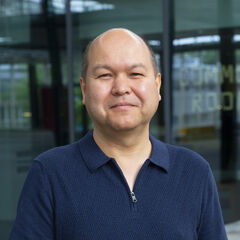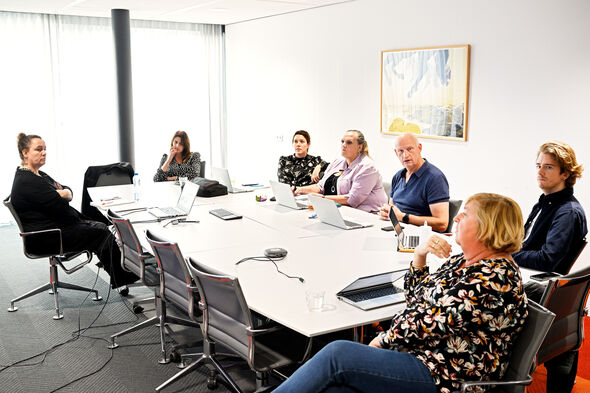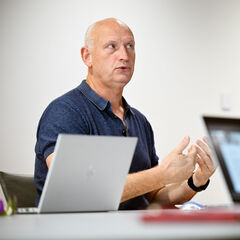
How is TU/e dealing with staff shortages?
More colleagues needed to relieve work pressure
An ageing workforce, absence due to illness, staff seeking greener pastures with other employers, TU/e contends with these problems on a daily basis. Paradoxically, while some tasks are ripe for efficiency improvements, nothing is being done for lack of personnel. What impact are staff shortages having on the employees left holding the fort? Cursor spoke to various managers who are making every effort to recruit new colleagues while managing as best they can with reduced staff numbers.
Given the age structure of the workforce, it's clear that over the next ten years we'll see a significant number of employees reach retirement age and leave TU/e. Even now, the university, like the rest of the Netherlands, is short of employees. This is nothing new for scientists, says Sander Stuijk, who works at the Department of Electrical Engineering. Ruben Trieling, head of ESA at Applied Physics and Electrical Engineering, shares his view that the restructuring of the Bachelor College comes at a bad time. In the wake of the hectic corona years, no one wants yet more work pressure. HR advisor Ilse Haak tells us how her service is doing all it can help TU/e retain its employees. In this regard, says Leon van de Vorstenbosch, chair of the Services Council, having Brainport, with the lure of high salaries, so nearby does TU/e no favors.
The current tightness in the Dutch job market isn't making Sander Stuijk nervous. He's the chair of the Electronic Systems group and has over twenty years' experience in the academic sector. Right now he's looking to recruit six or seven scientists to take up positions as PhDs candidates, EngD trainees or postdocs, and he has one vacancy among his academic staff.
Career opportunities
Recruitment is difficult, but that's always been the case, says Stuijk. “It's simply a fact that trade and industry offer better starting salaries and career opportunities. Our master's students are inclined to choose industry. ‘I'll have to spend the first four years working harder for less money if I do a PhD,’ they think. At EE we've always had to compete with the international market.”
Stuijk casts his mind back. “A long time ago, when no university in the Netherlands paid its PhD candidates, TU/e was the exception that proved the rule. It was how the university recruited sufficient numbers of PhD candidates. Universities have only been appointing PhD candidates as employees since the start of this century.”
“Most of our workforce comes from abroad,” says Stuijk, “and has done for years. At the moment only a few percent of all our new hires are Dutch citizens.” We're talking one new Dutch colleague every eighteen months.
Compromises
Stuijk isn't stressed but, “it's an anxious time, not knowing whether approved projects can be staffed. At the moment, for example, I've got approval for a European project and I can start recruiting, but I'm working with a time limit. I've got six months to find four people for Convolve, a project that aims to design economical computer chips. If I fail, I'll lose the grant.”
Successful grant applications to the European Commission or NWO bring in two-thirds of the EE department's turnover; tuition fees account for one-third. “It has been known for scientists to be taken on in haste with unresolved concerns about their suitability,” says Stuijk.
Solutions are few and far between. “We try to retain our graduating master's students, by talking to them personally, but as yet we've not had much success. We're also adapting the selection process, to identify the suitable candidates more quickly.” Stuijk sees as many as seventy to eighty letters of application arrive in response to each vacancy. But he believes a lot of them are nonstarters. “The art lies in separating the wheat from the chaff efficiently.”
Ruben Trieling is head of ESA at Applied Physics and Electrical Engineering and it's his job to support lecturers and students. His team, currently thirty-five strong, works in a variety of fields, including policy, quality assurance, study advice and counseling, administration, and internationalization. He's also in charge of Study Progress, a TU/e-wide chain process employing forty-five people. The combination of TU/e's ambitions for growth, increasing work pressure, and the tightness in the job market presents him with a challenge.
In recent months he has had fourteen vacancies. “Three colleagues found jobs elsewhere, three are on maternity leave, and a few people are on prolonged sick leave. In addition, we're going to need to bump up our staff numbers in order to cater for the envisaged growth.” He also has staff switching to other positions within his team. “That's good to see but it doesn't solve the problem.” While ten of his vacancies have now been filled, some of the successful applicants are not yet available.
Prioritizing
As long as vacancies are unfilled, prioritizing is the order of the day: a euphemism for never tackling the least urgent matters. This new development worries Trieling. “It's put various efficiency drives on hold. Improvements to our processes and service provision just aren't getting done. And without them, we can't do more work with the number of staff we currently have.”
He views the restructuring of the Bachelor College as an additional problem. “September 1st, 2023 has been set as the deadline for starting this process, and it's just too soon after the years of corona crisis. We've got no time to tackle work backlogs, or to catch our breath, recover from the 200 percent effort we've given. This is causing a lot of work pressure, especially as the primary process of delivering education also has to go on. Understaffing only adds to the work pressure.”
Trieling understands TU/e's ambitions and is keen to help achieve them. “But if you want to do justice to the TU/e slogan Where people matter, what you first need to do, right now, is call time-out.”
Career coaching
Ilse Haak has been HR Advisor Career Development at TU/e since January 2020. Her shaping of her own career, springboarded by studies in both business administration and psychology, has brought her to the ideal workplace. She creates policy and gives advice, but the bulk of her work, 60 percent, involves providing one-to-one career coaching. She talks about the various methods she uses to recruit and retain HRM staff.
“We have to be an attractive employer, now and in the future. This year we want to reduce the pressures on administrative and support (OBP), to provide relief in the short term. Our strategy is to focus on self-development. We want to expand our services and raise their profile. Inspiration Day is back after an absence of two years, and Career Week has been expanded into a two-week event for OBP and academic staff. For a limited period, Learning and Development is running extra workshops. These are on topical themes such as time management, flow in your work, and work pressure.”
Besides all this, TU/e has hired a recruiter for professional staff (synonymous with OBP), and in a short space of time we've seen forty-six new appointments to positions that were difficult to fill, mainly in ICT, and Finance and Control.
Eighty talents
HRM has also set up a new self-development program, giving a novel twist to its past programs TOP and TIP. Every service and department can now put forward 5 percent of its OBP staff as candidates. “This will help us identify a larger group of ambitious employees. The underlying aim is to offer them opportunities for personal development and, together, to address tomorrow's challenges,” Haak says.
One TU/e employee coached by Haak is Jolanda Oomen. Originally at F&C, she is making a career move to HRM, but not within TU/e. “I opted for coaching because I felt stuck in my work as a finance controller and I wanted to explore a broader range of opportunities,” says Oomen. “With Ilse Haak's help I looked into the possibilities. I was interested in HRM and had the chance to check it out by doing a variety of tasks for the HRM department and having networking chats with staff. I helped out at the Career Event, for instance.”
My self-confidence improved through coaching and I got the final push I needed to start professional training
Oomen enjoyed the coaching because it gave her someone to bounce ideas around with and drew her out of her comfort zone. “My self-confidence improved and I got the final push I needed to start professional training. That led to a new job.” As of November 30th, Oomen will be working in HRM at a hospital in Venlo. “An opportunity has opened up that I want to seize. And it's no bad thing to be moving on after nine years.”
Taking stock
CEC staffer Lieke Thijssen also found career counseling beneficial. In her case, the process led to the decision to stay at TU/e. “I gained a lot from the experience. I work as a communication advisor in HRM and last year I turned forty. A classic moment to take stock of your career. What do I really want? I wondered. The whole process brought home to me just how well my present work suits me. Writing texts, being involved in the design process and coming up with solutions all provide outlets for my creativity. It made me realize that what I love doing is online communication and job market communication, both of which involve relatively concrete improvements and tangible results. Yes, it was nerve-wracking asking colleagues for 360-degree feedback. The results were useful, even if they didn't come as any surprise. Now I can present my strengths with conviction.”
Absence from work figures
Ask Leon van de Vorstenbosch whether staff shortages are a topic of discussion within his Services Council - he's the chair - and he'll seize the opportunity to explain how busy the university's absence from work figures are keeping the Council members, himself included. “I've analyzed the employee absence figures from the past five years and can tell you that they're at 1 percent for General Affairs and in excess of 7 percent for Finance and Control. The root causes proved to be the reorganizations - in other words the structural changes - and perceived work pressure. Now we can put a probing question to HR: Now that we have these figures, what are you going to do with them?"
Van de Vorstenbosch decries TU/e's balance between auxiliary and academic staff. “It stands at 0.3, which means that we have just one auxiliary staffer to every three academics. Here in Eindhoven we have the worst rate of OBP to academic staff of any Dutch university. Elsewhere in the Netherlands this rate is 0.6 or even 0.8. Our OBP staff are under enormous pressure.”
He sees the restructuring of the services that got underway in 2021, SQUAD, as a good opportunity for taking a close look at workloads, and the underpayment employees receive when they are assigned extra roles, as happens time and time again. “Given today's tight job market, I find the Executive Board's intention to improve service provision while maintaining the same number of FTEs simply unrealistic.”
Brainport
“What's more, a lot of vacancies aren't being filled. I've seen this happening for years at Finance and Control and at Real Estate,” says Van de Vorstenbosch, contract manager building maintenance at RE. “People are being asked to take on broad roles but aren't offered a high salary for doing so. It's simply a fact that salaries are higher outside TU/e. We can't compete with ASML. In this respect, having Brainport so nearby does TU/e no favors.”
Were the ambition to expand to 25,000 students in 2030 be achieved, the Services Council would be concerned about administrative and support staff. “For years we had 3,300 employees, for the past two years we've had 4,800, but the Services Council doesn't know how that figure breaks down into OBP and academic staff. My worry is that the proportion of OBP staff would be too small to serve all the students.”
Another thorn in Van de Vorstenbosch's side is the solution managers seek to reduce their staff's work pressure. “A lot of contractors are hired in from consultancies and agencies. The knowledge they acquire disappears with them as soon as their contract ends. Both team continuity and efficiency suffer as a result. What's more, this temporary solution is an expensive one.”








Discussion